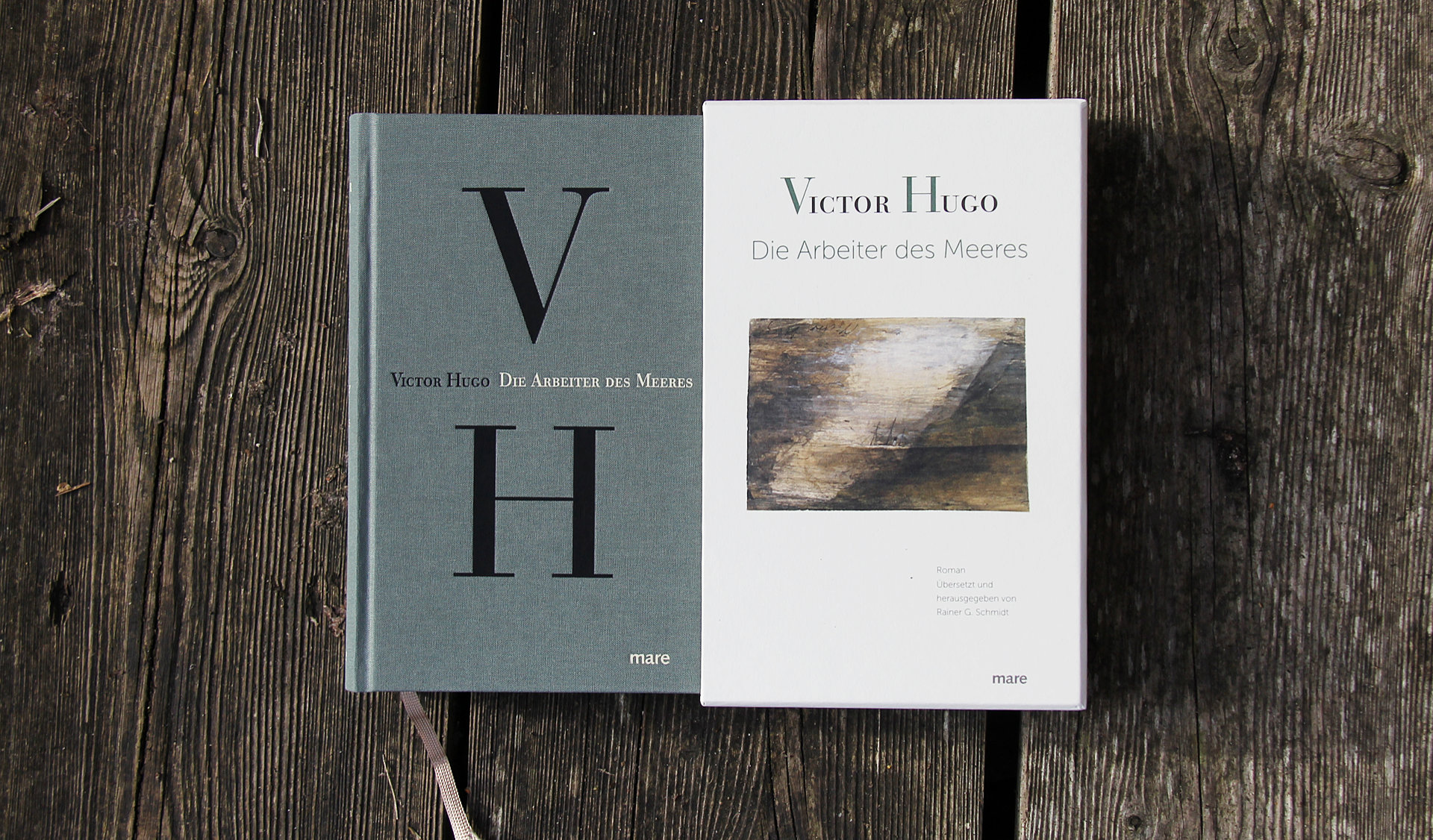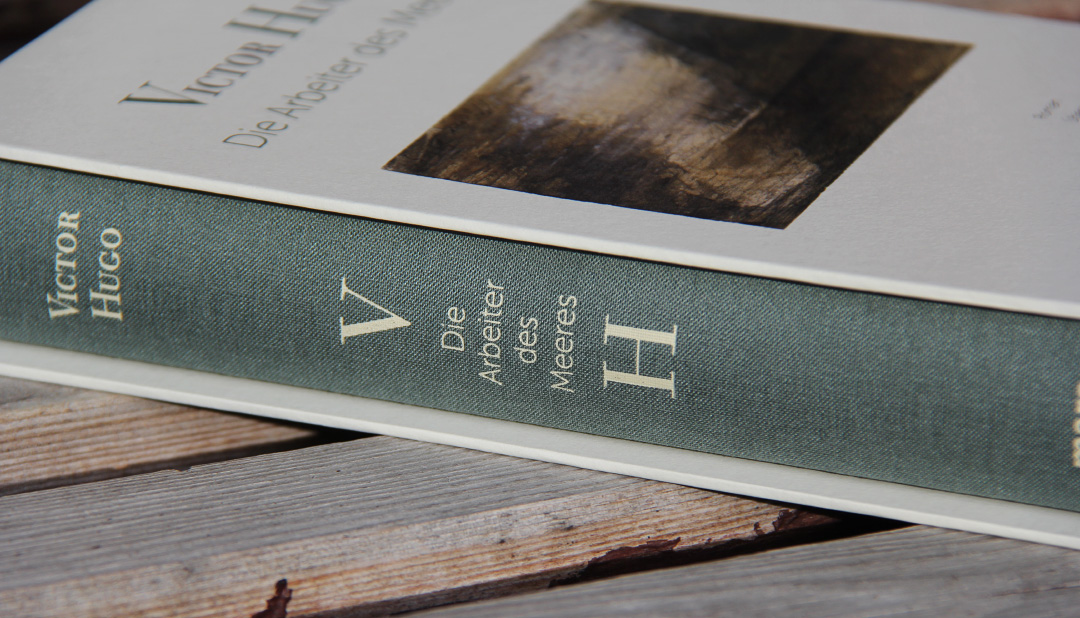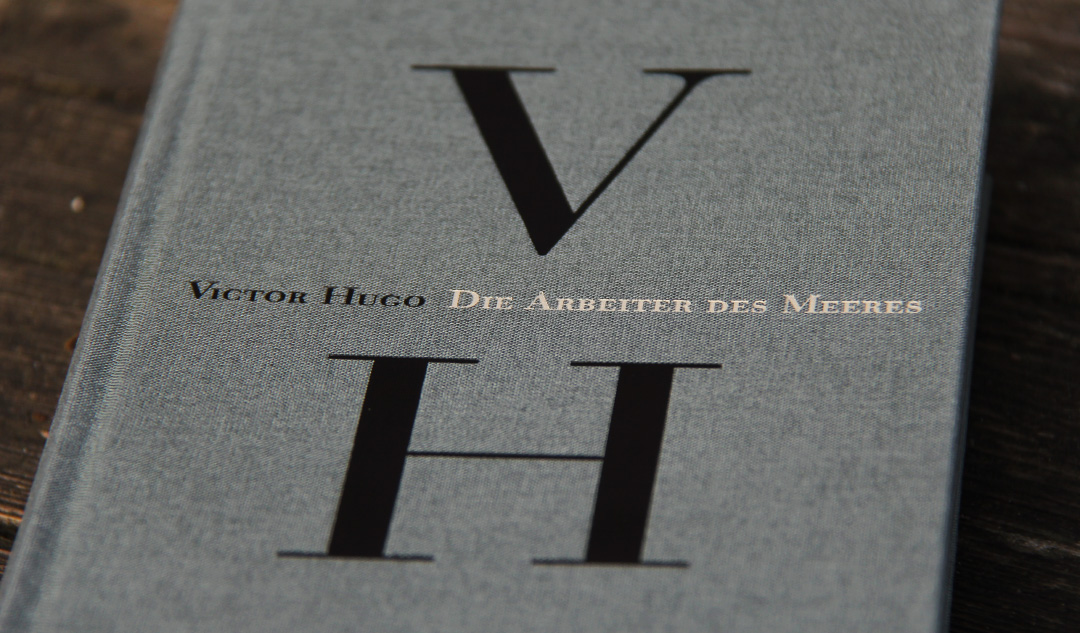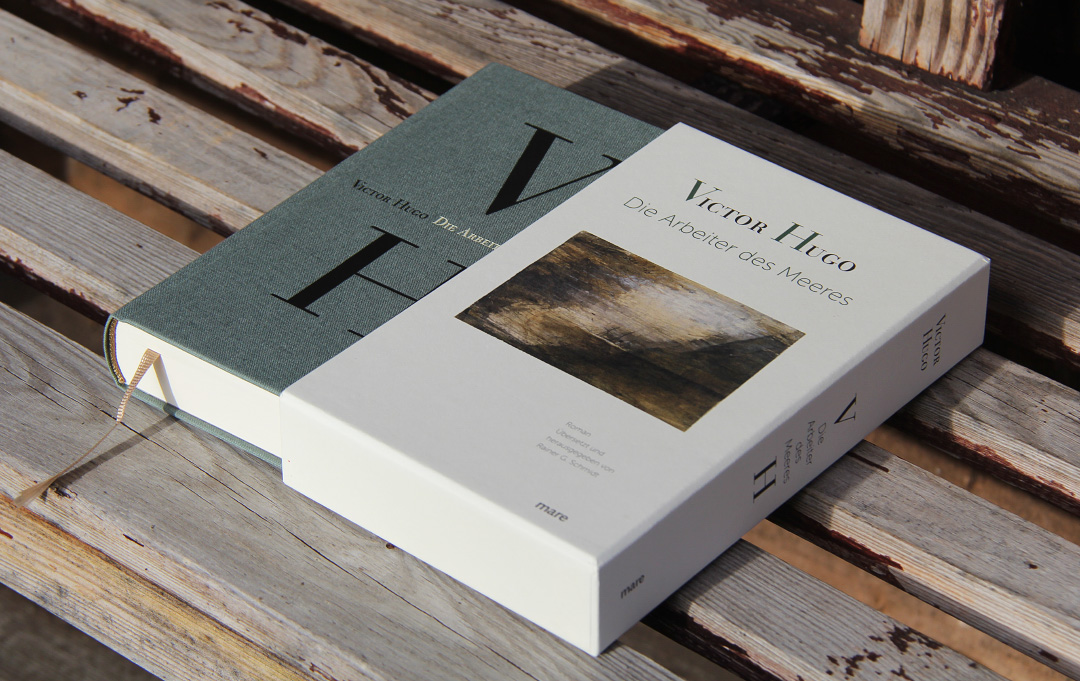Toilers of the Sea • Victor Hugo

As many of you already know, I’m a Mare Classics fanboy and always look forward to the preview to see what new book will be released in this series I love so much. This time it’s a double hit: as always, a beautiful linen-bound edition with an elegant slipcase — and on top of that, a newly translated novel by Victor Hugo. In Bavaria, one might say, “des is a gmahde Wiesn” (a sure thing). Naturally, this book was read immediately upon arrival, while the rest of the stack had to wait. After spending the past few weeks deep in the fantasy genre, I was once again craving the sea and a smooth, timeless classic from one of literature’s great legends.

Victor Hugo, the French author whose works are associated with Romanticism and Realism, lived from 1802 to 1885. He published poetry, novels, and plays and was also very politically active. In 1851 he opposed Napoleon (Napoleon III — “Napoléon le Petit,” not the original Waterloo-emperor-war-and-peace Napoléon) and went into exile. He chose the Channel Islands, which belong to England but are French-speaking — first Jersey, then Guernsey — as his refuge.
The island of Guernsey is also the setting of Toilers of the Sea. The fisherman Gilliatt, an outsider and somewhat eccentric loner, falls in love with the beautiful Déruchette — a young woman of good standing with whom he seemingly has no chance. But then an opportunity arises for him to win her love. Not, as one might expect, by courting her, but through a struggle against the sea itself — a relentless battle with the forces of nature.
As in Les Misérables, Victor Hugo proceeds very systematically, first introducing and characterizing each figure in detail — elaborate, yet entertaining, attentive to detail, and with his typical dedication. The characters feel believable and real right away. We learn a great deal about the island of Guernsey and its superstitious, somewhat backward inhabitants — exactly as one might expect from a remote place. Yet it’s also strangely alluring, as such islands always awaken in me a longing for the sea and the peace that seems to dwell there. Hugo’s characters — Gilliatt, Mess Lethierry, Sieur Clubin — are, like Jean Valjean, somewhat exaggerated, larger than life, and strikingly drawn. But that suits the story perfectly, especially as it unfolds further.

I quickly immersed myself in this book and its setting, vividly picturing the island of Guernsey. But what truly makes this novel a masterpiece is the sea itself. I can hardly think of a book more fitting for Mare’s Classics series than this one. Gilliatt begins a battle with the sea and becomes a titan, a hero, rising above himself and facing every challenge the ocean throws his way. Hugo renders the sea with such realism, bringing it to life through his descriptions in a way I have rarely encountered in literature. With an eye both for detail and the grand scale — the dark storm clouds, the dense and mysterious fog, the black granite cliffs of the Channel Islands, the very water itself — all came alive before my mind’s eye, as vividly as if I were watching a film.
Stylistically, I expected something closer to Les Misérables: long, flowing sentences in the typical romantic style. But quite the opposite is true. When writing about the islanders or Gilliatt, Hugo’s sentences are short, clear, and simple. At first, I was a little disappointed, only to realize that Hugo uses this deliberately as a stylistic device. For when he turns to the sea, to nature, and to what he finds within it, his prose becomes magnificent again — full of his unique poetry. I’d like to include one fairly long quotation: Gilliatt discovers a small grotto on a lonely rock formation and describes both its appearance and the enchantment that seems to dwell there:
“One could not help but imagine that in this crypt, upon this altar base, a naked celestial being might have appeared — one lost in eternal thought, vanishing at the approach of man. It was almost impossible not to conjure such an apparition within this solemn cell; born of reverie, it arose of itself: barely discernible shoulders bathed in chaste light; a forehead immersed in morning glow; the oval of an Olympian face; the mysterious curves of a bosom; modestly crossed arms; hair streaming in the dawn; indescribable hips traced pale in sacred mist — in short, a nymph-like form with the gaze of a virgin, a Venus rising from the sea, an Eve emerging from chaos. Such dream figures presented themselves naturally. It seemed unlikely that no such phantoms existed here — that just moments before, a wholly naked beauty, bearing a star within her, had not stood upon this altar. On this pedestal, emanating unspeakable rapture, one could see in the mind’s eye a white, living being enthroned. In spirit, amid the silent adoration of this cave, one beheld an Amphitrite, a Thetis, or a love-imbued Diana — the embodiment of an ideal, born of a sunbeam, gazing kindly upon the shadows.” (p. 312)
The book reads smoothly, and Hugo’s use of numerous references to Greek, Roman, and Biblical mythology enriches the atmosphere. The many nautical terms and descriptions also add positively to the mood — though I admittedly skimmed over a few overly detailed passages. But those were few and far between. Hugo takes his time, and I was always eager to see how the story would continue. At times, he digresses into long explorations — describing places, people, or philosophical and metaphysical ideas; reflecting on the universe, the forces of nature, or faith itself. On two pages, he even lists all the different winds known to common folk, science, and the world. I thoroughly enjoyed all of it — it made me dream.
Toilers of the Sea is what Moby-Dick could have been: the perfect balance between a forward-moving, gripping story that deeply moves the reader and a gaze that extends beyond the simple and visible. A vivid portrayal of the island, nature, and the sea in all their aspects. Whether Hugo’s descriptions are factually accurate is beside the point — at times, he seems intent on rationalizing every natural phenomenon. But I believed him all the same, and the sheer joy of reading proved him right.

Of course, I also want to say a few words about this Mare edition. At this point, I have to thank everyone at Mare Verlag. Thank you for making such books, for discovering these treasures, repackaging them, and presenting them with so much care and devotion. I don’t know if you realize what a joy your classics are for me — and hopefully for others as well — and I sincerely hope that this series will continue for a long time. The hours I spend with your books could not be more delightful.

Once again, this is a beautiful, high-quality edition to hold in your hands. The linen cover evokes the dark, seaweed-covered rocks — or the kelp-strewn waters of the English Channel. The large letters on the cover have a clear meaning, reflected within the book itself: Victor Hugo immortalizes himself by giving the Douvres rocks the shape of his own initials — the same initials embossed on this cover. Dark rocks amid the sea. The paper is wonderfully smooth, and the sewn binding shows that this is once again premium book craftsmanship.
The main story spans 524 pages, followed by a detailed appendix. There are notes explaining certain terms, then an afterword by the translator Rainer G. Schmidt — informative, though not particularly revelatory. Finally, and this makes up the largest part, several of Hugo’s texts about the Channel Islands archipelago. He included these in an edition preceding the novel, essentially to establish the full setting. I personally found these texts rather dull. The novel itself conveys a far better impression of the place and landscape, combining that with an engaging story.

Conclusion: Victor Hugo’s Toilers of the Sea is a brilliant masterpiece by one of the greatest authors of all time. The descriptions of the sea, the people, the small island, and the excursions into the worlds of nautical science, philosophy, nature, and the human soul — all are powerfully rendered, unfolding like a film before the reader’s inner eye, carried by a language that lingers long after reading. A story that gripped me and left me thoughtful. I can wholeheartedly recommend the beautiful Mare edition. A wonderful book.
Book information: Toilers of the Sea • Victor Hugo • Mare Verlag • 672 pages • ISBN 9783866482548

Lieber Tobi,
ich würde dir an dieser Stelle gerne einen ausführlichen Kommentar hinterlassen. Aber Fakt ist: Mir fehlen einfach die Worte. Hugo und das Meer sind schon mal zwei Kriterien, die mich sofort ins Schwärmen geraten lassen. Tja, und dann kannst du dieses Werk auch noch empfehlen und machst Lust aufs Entdecken. Ich will jetzt einfach nur den Mare-Verlag plündern :D
Liebe Kathrin,
also das Buch könnte dir auch echt gut gefallen. Victor Hugo und dazu die schöne Aufmachung, da sind wir ja beide auf einer Wellenlänge. Der Mare Verlag ist einfach klasse, die haben einfach echte Knaller im Programm. Hast du eigentlich auch “Ein Leben” von Maupassant schon gelesen? Das gibt es auch beim Mare Verlag und das ist auch einfach nur ein geniales Buch. Das kann ich dir auch sehr empfehlen.
Liebe Grüße
Tobi
“Ein Leben” habe ich mir noch nicht gegönnt. In “Die Arbeiter des Meeres” habe ich auf der Buchmesse ausgiebig geblätter – optisch und haptisch wirklich toll gemacht! In den hiesigen Buchhandlungen sind die Bücher des Mare Verlags leider nie zu finden, daher habe ich hier eine kleine Titelliste und werde irgendwann einmal eine Sammelbestellung beim Verlag machen. ;)
Lieber Tobi,
Victor Hugo steht auch schon sehr lange bei mir rum, hab ausführlich überlegt, ob ich nun “Vom Winde verweht” oder “Die Elenden” als nächstes Schmökerbuch beginne. Naja, da ich gerade aber auch im Studium in Amerikas Westen des 17/18 Jhs unterwegs bin, ist es dann doch ersteres geworden ;) Muss dich wieder mal loben, für die tolle Rezension, man liest einfach heraus, dass du 1. das Meer sehr magst und Hugo und 3. dass du sehr angetan bist vom MARE Verlag :-D Ich mag auch sehr gerne Bücher mit dem Thema Meer, es weckt immer eine gewisse Sehnsucht beim Lesen, und ich mag das! Lass dir ganz liebe Grüße da ;) In Bayern war ich auch neulich unterwegs ^^ Als Österreicherin kommt man sich da gar nicht einmal so fremd vor ;)
Liebe Tinka,
Victor Hugo ist klasse, da gibt es nichts. “Vom Winde verweht” habe ich auch auf meinem SuB und das ist schon auch ziemlich weit nach oben gerutscht. Das kommt bald dran. “Die Elenden” kann ich dir auch echt empfehlen, ein klasse Buch. Aber darüber hab ich auch schon gebloggt.
Das Meer ist etwas, auf das ich immer wieder Lust habe. Genauso wie Liebesgeschichten. Und wenn einige Zeit vergeht, dann greife ich zu solch einem Buch und das ist dann immer wieder echt ein ganz besonderer Genuss.
Wo warst du denn in Bayern unterwegs? In München? Also in Österreich kommt man sich als Bajuware auch nicht sonderlich fremd vor. Aber ist ja auch gleich ums Eck ;)
Liebe Grüße
Tobi
Toller Tipp, tolle Rezi. Hatte ich noch nie von gehört. Du kannst nicht zufällig was über die Übersetzung sagen (bei “neu übersetzt” klingeln immer meine Alarmglocken)? Meinen herzlichen Dank!
Lieber Simon,
also ich habe keinen Vergleich, was die Übersetzung betrifft, aber bei dem Buch fällt nichts negativ auf. Es liest sich geschmeidig und es gibt keine seltsamen unpassenden Worte oder Namen. Der Mare Verlag ist aber diesbezüglich immer ziemlich hochwertig unterwegs. Ich hab über die beiden Bücher von Maupassant in der Vergangenheit gebloggt und da hatten andere Leser mit anderen Ausgaben recht negative Erfahrungen gemacht, die ich bei den Ausgaben vom Mare Verlag nicht ausmachen konnte. Da wurde dann beispielsweise der Name der Protagonistin seltsam eingedeutscht oder so. Das hast du bei diesen Büchern hier definitiv nicht. Aber dafür muss man auch tiefer in die Tasche greifen.
Ich hoffe das Buch ist was für Dich und gefällt dir genauso gut wie mir. Aber Victor Hugo, das Meer, Mare Verlag, mehr braucht man da nicht zu sagen ;)
Liebe Grüße
Tobi
Lieber Tobi,
herzlichen Dank für die Zusatzinfo – das klingt super. Der Kombination von Hugo und Meer werde ich mich sicher nicht entziehen können :-)
Lieber Tobi,
das klingt wirklich wunderbar & sehr interessant – deine Rezension ist mal wieder sehr überzeugend. Ich glaube, den Roman möchte ich auch gern lesen! Nicht zuletzt, weil ich auch gerade wieder Sehnsucht nach Meer habe …
Liebe Grüße
Petra
Liebe Petra,
das Buch gefällt Dir bestimmt. Ich hab bei der Lektüre richtig Lust auf Reisen bekommen. Ich liebe ja Inseln und hätte echt Lust auf den Kanalinseln mal zu sein. So Tage wie heute, wenn es wärmer ist, aber ein ziemlicher Wind weht, da weckt das bei mir auch die Sehnsucht nach dem Meer. Da sind dann solche Bücher immer perfekt.
Liebe Grüße
Tobi
Eine sehr schöne Buchvorstellung. Aber selbst einem ausgezeichneten Blogger wie Dir unterläuft es, auf den Klappentext (bzw. den Text auf dem Schuber) hereinzufallen: Gilliat ist *kein* Fischer. Hugo bzw. der auktoriale Erzähler macht es ganz klar, dass er von seiner Mutter ein kleines Häuschen geerbt hat und genug Geld, um davon (wenn auch karg) leben zu können. Er übt deshalb keinen Beruf aus, auch wenn er regelmässig auf dem Meer ist und wohl auch hin und wieder fischt.
Ebenso wenig ist es übrigen Gilliat, der die Grotte schildert. (Wem sollte er sie schildern? Er ist alleine dort.) Sondern es ist der Erzähler, der die Grotte für uns Leser und Leserinnen schildert.